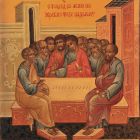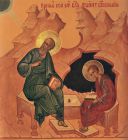|
Страница 2 из 5
Feeling the love of Christ toward himself, but as yet not enlightened with grace by the Holy Ghost, he decides to ask for himself and his brother James a place close to the Lord in His coming Kingdom and learns of the impending sufferings for both of them.
 After the Lord's Resurrection, we often perceive Apostle John together with Apostle Peter, similarly with whom he is considered a pillar of the Church and often sojourning to Jerusalem. True to the Lord's directive he cared for the Holy Virgin Mary as a most devoted son and only after her Blessed Dormition did he begin to preach in other lands. After the Lord's Resurrection, we often perceive Apostle John together with Apostle Peter, similarly with whom he is considered a pillar of the Church and often sojourning to Jerusalem. True to the Lord's directive he cared for the Holy Virgin Mary as a most devoted son and only after her Blessed Dormition did he begin to preach in other lands.
During Apostle John's ministry, one notices the singularity that he chose for himself a specific province and directed all the energy of his soul to eradicate paganism therein and strengthen the holy faith. As example of his specific cares were the seven Churches of Asia Minor - in Ephesus, Smyrna, Pergamos, Theatira, Sardis, Philadelphia and Laodician. Preeminently he lived in Ephesus.
 During the time of Emperor Domitian (81-96), Apostle John, as the sole surviving Apostle, was summoned to Rome and by the decree of this persecutor of the Church was thrown into boiling oil, but the power of God saved him unscathed just as it saved the three lads from the fiery oven. Then Domitian sent him to the desert island of Patmos. Here John wrote the Apocalypse or Revelations of the fate of the Church and the world. During the time of Emperor Domitian (81-96), Apostle John, as the sole surviving Apostle, was summoned to Rome and by the decree of this persecutor of the Church was thrown into boiling oil, but the power of God saved him unscathed just as it saved the three lads from the fiery oven. Then Domitian sent him to the desert island of Patmos. Here John wrote the Apocalypse or Revelations of the fate of the Church and the world.
After the death of Domitian, Apostle John returned to Ephesus from exile. The Bishops and presbyters of the Ephesian Church showed him three Gospels written by the Apostles Matthew, Mark and Luke. Having approved these Gospels, Apostle John deemed it necessary to supplement that which was lacking and which he knew well, being the last of the living eyewitnesses. This was of great importance, since toward the end of the first century there appeared in the Christian world several active gnostic sects which abased and even denied the Divine merit of the Lord Saviour. It was imperative to protect the faithful from that pedagogy.
|